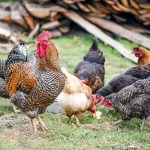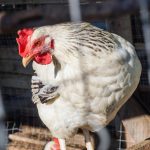Winter can have a significant impact on egg production in poultry. The shorter days and colder temperatures can lead to a decrease in egg production as hens naturally respond to the changes in daylight and temperature. During the winter months, hens may experience a decrease in egg production due to the decrease in daylight hours. This decrease in daylight triggers a hormonal response in the hens, causing them to lay fewer eggs. Additionally, the colder temperatures can also affect egg production as hens may use more energy to stay warm, leaving less energy for egg production. It is important for poultry farmers to understand these impacts in order to effectively manage and maintain egg production during the winter months.
In addition to the natural factors that impact egg production, winter can also bring about other challenges such as increased stress and health issues for the hens. The cold temperatures can cause stress on the birds, leading to a decrease in egg production and potential health issues. It is important for poultry farmers to be aware of these impacts and take proactive measures to mitigate the effects of winter on egg production.
Table of Contents
Providing Proper Nutrition for Winter Egg Production
Proper nutrition is essential for maintaining egg production during the winter months. During this time, hens may require additional nutrients to support their energy needs and maintain egg production. It is important for poultry farmers to provide a balanced diet that includes essential nutrients such as protein, vitamins, and minerals. Additionally, hens may benefit from supplemental feed to help support their energy needs during the colder months.
In addition to providing a balanced diet, it is important for poultry farmers to ensure that hens have access to clean water at all times. Water is essential for egg production and overall health, especially during the winter months when hens may be using more energy to stay warm. By providing proper nutrition and access to clean water, poultry farmers can help support egg production during the winter months.
Managing Daylight and Artificial Lighting
Managing daylight and artificial lighting is crucial for maintaining egg production during the winter months. As daylight decreases, hens may experience a decrease in egg production due to the hormonal response triggered by the change in daylight hours. To mitigate this effect, poultry farmers can use artificial lighting to supplement daylight hours and help maintain egg production. By providing additional light in the early morning or evening hours, poultry farmers can help stimulate egg production and support overall productivity during the winter months.
It is important for poultry farmers to carefully manage artificial lighting to ensure that hens receive enough light without causing stress or disruption to their natural rhythms. By gradually increasing the amount of artificial light and providing a consistent lighting schedule, poultry farmers can help support egg production without causing unnecessary stress to the hens. Managing daylight and artificial lighting is an important aspect of maintaining egg production during the winter months.
Ensuring Coop Comfort and Warmth
Ensuring coop comfort and warmth is essential for maintaining egg production during the winter months. The cold temperatures can cause stress on the birds and lead to a decrease in egg production if proper measures are not taken to provide a comfortable and warm environment. Poultry farmers can help support coop comfort and warmth by insulating the coop, providing adequate ventilation, and using heating sources if necessary.
Insulating the coop can help maintain a comfortable temperature for the hens and reduce the amount of energy they need to stay warm. Additionally, providing adequate ventilation is important for maintaining air quality and preventing moisture buildup, which can lead to health issues for the hens. If necessary, poultry farmers can also use heating sources such as heat lamps or heated perches to help maintain a comfortable temperature in the coop. By ensuring coop comfort and warmth, poultry farmers can help support egg production during the winter months.
Minimizing Stress and Maintaining Health
Minimizing stress and maintaining health is crucial for supporting egg production during the winter months. The cold temperatures and changes in daylight can cause stress on the hens, leading to a decrease in egg production and potential health issues. Poultry farmers can help minimize stress by providing a comfortable and warm environment, managing artificial lighting, and ensuring proper nutrition.
In addition to minimizing stress, it is important for poultry farmers to maintain the overall health of the hens during the winter months. This includes regular health checks, providing access to clean water, and ensuring that the hens have a balanced diet that includes essential nutrients. By taking proactive measures to minimize stress and maintain health, poultry farmers can help support egg production during the winter months.
Monitoring Egg Production and Adjusting Practices
Monitoring egg production and adjusting practices is essential for maintaining productivity during the winter months. Poultry farmers should regularly monitor egg production to track any changes or trends that may indicate issues with productivity. By keeping detailed records of egg production, poultry farmers can identify any potential problems and make adjustments as needed.
In addition to monitoring egg production, poultry farmers should be prepared to adjust their practices as necessary to support productivity during the winter months. This may include making changes to the lighting schedule, adjusting feeding practices, or implementing additional measures to support coop comfort and warmth. By staying proactive and making adjustments as needed, poultry farmers can help maintain egg production during the winter months.
Implementing Seasonal Breeds for Increased Winter Egg Production
Implementing seasonal breeds is another strategy for increasing egg production during the winter months. Some breeds of chickens are better suited for cold weather and may be more productive during the winter months compared to other breeds. Poultry farmers can consider implementing seasonal breeds that are known for their ability to maintain productivity in colder temperatures.
By implementing seasonal breeds, poultry farmers can help support egg production during the winter months and potentially increase overall productivity. It is important for poultry farmers to research and select breeds that are well-suited for cold weather and have a reputation for maintaining productivity during the winter months. Implementing seasonal breeds is a proactive strategy for increasing winter egg production and supporting overall productivity in poultry farming.
Meet Walter, the feathered-friend fanatic of Florida! Nestled in the sunshine state, Walter struts through life with his feathered companions, clucking his way to happiness. With a coop that’s fancier than a five-star hotel, he’s the Don Juan of the chicken world. When he’s not teaching his hens to do the cha-cha, you’ll find him in a heated debate with his prized rooster, Sir Clucks-a-Lot. Walter’s poultry passion is no yolk; he’s the sunny-side-up guy you never knew you needed in your flock of friends!







